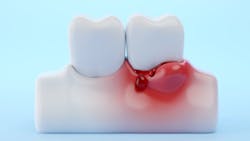Is dentistry truly committed to combatting CIPD? A researcher's call for change
Editor’s note: This is part four of a four-part interview series with Tim Donley, DDS, MSD.
Part one: Dentistry's narrative has failed. How should we change?
Part two: 6 questions to get your dental office practicing evidence-based care
Part three: What is chronic inflammatory periodontal disease (CIPD)?
Anne Rice: Will you speak about the research you are involved in within cardiology?
Dr. Donley: Cardiology gets it. We are in the middle of a study looking at patients who have had a first heart attack or another adverse cardiovascular event. Half of those patients are continuing down whatever dental path they were on prior to the cardio event. The other half we are treating aggressively to eliminate any noted sites of inflammation every three months. The goal is to keep them free of chronic inflammatory periodontal disease (CIPD) over a two-year period.
We are determining if controlling the oral contribution to systemic inflammation reduces the risk for a second adverse cardiovascular event. While it is too early to report on results, the cardiologists are already interested in having a dental operatory in their clinic so that the burden of oral inflammation can be lifted from their patients as efficiently as possible.
More about CIPD ... What is chronic inflammatory periodontal disease (CIPD)?
Cardiology realizes how important a preferred level of oral health is to cardiovascular risk reduction. It is time for us in dentistry to not only champion this message, but also to “walk the walk.” In at-risk patients, we can no longer simply clean their teeth, give them a fluoride treatment, take a couple of bitewings, give them a thumbs-up or thumbs-down on their oral hygiene, and then appoint them to do it all again in six months.
Rice: Tell me one thing you would like the dental community to understand about periodontal disease and one thing you wish the public would understand about oral health.
Donley: I wish the dental community felt a great sense of urgency about CIPD. The fact that there are so many people who see a dental professional regularly but are still walking around with areas of chronic inflammation in their mouths suggests that maybe we need to look in the mirror and consider how successful our supposed dedication to prevention has been.
We can only prevent disease after health has been established. We have spent considerable effort on “prevention,” yet more people have evidence of periodontal involvement today than they did 20 years ago. How can that be?
I think dentistry needs to refocus on making sure that any subgingival disease is recognized and treated, and then prevent relapse. The relationship between ongoing oral inflammation and systemic health is making it harder and harder to justify the care delivered in patients who have had sites of ongoing subgingival disease despite regular dental visits, which consisted of little more than prophylaxis and oral hygiene instruction.
I wish dentistry realized that it is time for us to get serious about CIPD and become more outcome based, rather than procedure based. When I hear patients say things like “I just want them cleaned for now” or “I don’t want any x-rays” or “I’ll do it if my insurance covers it,” I am reminded that dentistry still has a lot of work to do.
For too long now, patients have ordered dental services like they are choosing from an à la carte menu. Dentistry would be better off if patients were educated as to the benefits of seeking the outcome of a preferred level of oral health. Once they believe in the outcome, the procedures necessary to achieve the outcome become less optional. It would then be less likely that we would have to acquiesce and provide only the treatment that patients think they want.
Patients need to know that CIPD is serious and there is an urgency to treat once disease is noted. I know this, some of my colleagues know, only a few in medicine know, and almost no patients know this. Patients are tolerant of disease and we in dentistry often reinforce this. For too long, in patients’ minds, the lack of any pain and an acceptable ability to chew has been the benchmark for dental success. We reinforce that when we ask if anything is hurting and then proceed immediately to the prophy. Thus, partnering with a dental professional for life (not just when something hurts and when you think your teeth need a “good cleaning”) is important.
Rice: Is there anything else you’d like to share?
Dr. Donley: Where is dentistry going in the future? We need to claim our rightful place on the health-care stage. The emerging science delineating the direct and indirect role that pathogens of oral origin and the inflammation they initiate play in diseases such as Alzheimer’s, cardiovascular disease, etc. suggest that we in dentistry can take part in managing these diseases. We not only can help, but I also believe we have the responsibility to do so.
It’s time for all stakeholders in medicine to realize that the most important health-care provider that a patient can see to ensure the highest level of wellness over their lifespan is a dental hygienist who is focused on helping patients achieve a preferred level of oral health—a set of teeth that are functional, esthetic, relatively disease free over time, and maintainable. The hygienist regularly screens for below-the-gumline issues, formulates a plan to get any areas of disease to resolve, counsels and assists the patient in making lifestyle changes that affect both oral and systemic health, and assists medicine in managing the systemic diseases that have an oral inflammatory connection. Today’s dental hygienist, and dentistry in general, needs to think beyond the mouth.
Rice: Thank you, Dr. Donley, for your time and insight. It was more than I could have imagined.
After the entire interview, I had so many thoughts running through my mind. How do we get the industry to understand a science-based approach versus our old beliefs? Should education be focused in other areas, and if so, how is that accomplished? What should our checks and balances be for our patients? Should we speak louder to our dental organizations, and perhaps government? How do we build a bridge with medicine that is effective?
You may find Dr. Donley at beyondthemouth.com.
Editor's note: This article appeared in the November/December 2023 print edition of RDH magazine. Dental hygienists in North America are eligible for a complimentary print subscription. Sign up here.
Anne O. Rice, BS, RDH, CDP, FAAOSH, founded Oral Systemic Seminars after almost 30 years of clinical practice and is passionate about educating the community on modifiable risk factors for dementia and their relationship to dentistry. Anne is a certified dementia practitioner, a longevity specialist, a fellow with AAOSH, and a consultant for Weill Cornell Alzheimer’s Prevention Clinic, FAU, and Atria Institute. Reach out to Anne at anneorice.com.
About the Author

Anne O. Rice, BS, RDH, CDP, FAAOSH
Anne O. Rice, BS, RDH, CDP, FAAOSH, founded Oral Systemic Seminars after over 35 years of clinical practice and is passionate about educating the community on modifiable risk factors for dementia and their relationship to dentistry. She is a certified dementia practitioner, a longevity specialist, a fellow with AAOSH, and has consulted for Weill Cornell Alzheimer’s Prevention Clinic, FAU, and Atria Institute. Reach out to Anne at anneorice.com.
